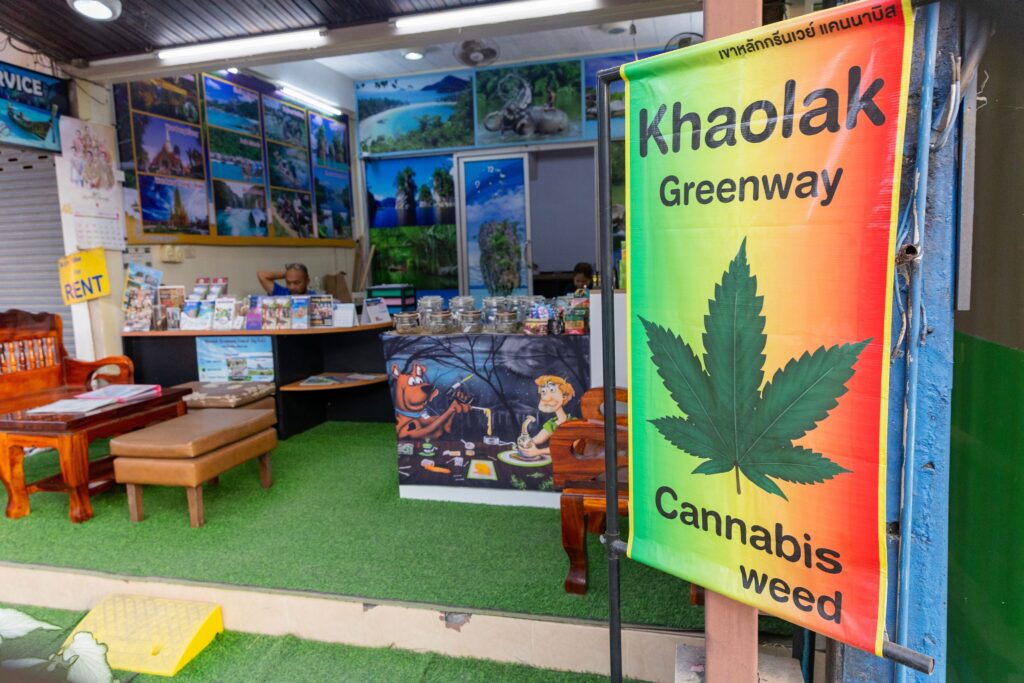
Thailand leaders believe the country’s move to decriminalize led to a surge of cannabis shops and unintended recreational use, and are backpedaling the law, clarifying several changes.
A draft bill to ban recreational use of potent cannabis products was published online on Jan. 9. Under the bill proposal, anyone who smokes cannabis for recreational purposes will face a fine of up to 60,000 baht (about $1,709.53). Those selling cannabis or its extracts for recreational purposes face up to one year in jail or 100,000 baht (about $2,849.21) in fines, or both.
Under the proposed new rules, advertising or marketing campaigns for cannabis flower, extracts, and any paraphernalia used to smoke will be prohibited. Driving while high on cannabis would be punishable with a fine of up to 20,000 baht ($569.83), or one year in jail.
The government will also tighten licensing rules for cannabis planting, sales, exports and imports.
The changes are meant to rectify what lawmakers couldn’t foresee earlier.
“We drafted this law to prohibit the wrong usage of cannabis,” Health Minister Cholnan Srikaew told Thai media outlets. “All recreational usage is wrong.”
Published on the health ministry’s website on Tuesday, the new draft bill clarifies that only medical uses of cannabis are allowed, while outlawing recreational use.
Thailand Decriminalization Plan Criticized
In a series of steps to decriminalize low-potency pot in Thailand, the first Asian nation to decriminalize pot, after laying out regulations for medical cannabis in 2018. That made Thailand the first Southeast Asian nation to legalize cannabis for medical use. A few years later, the Thai cabinet approved amendments to the country’s drug laws to allow for the production and sale of medical marijuana, including cannabis flower.
In preparation for the new law, Thailand health and agricultural ministries collaborated to distribute one million free cannabis plants for residents to grow at home for medicinal purposes.
On June 9, 2022, Thailand removed cannabis from the nation’s list of banned drugs. The catch, however, was that restaurants and cafes are permitted to sell foods and beverages infused with cannabis, but only if they contain no more than 0.2% THC, which would be called industrial hemp in the U.S.. Products with higher concentrations of THC are allowed for medical purposes.
This didn’t appear to impact the ability of people in Thailand to quickly find legal loopholes.
After around 6,000 cannabis shops opened in a green rush, lawmakers backpedaled after they seemingly accidentally legalized recreational use. The Strait Times reported the new law created a “regulatory vacuum,” leading to a surge in new businesses. Thailand’s newly-elected Prime Minister Srettha Thavisin spoke out against the recreational use of pot after concerns of drug abuse were raised, and vowed to reclassify cannabis as a narcotic.
In September 2023, Thavisin declared war on drugs as a national agenda in his campaign, Bangkok Post reports, focusing on meth, but with part of the plan to scale back the country’s cannabis policy. “A consensus has been reached among the 11 coalition parties as well as all other parties in the opposition that the need to tackle the drugs problem is high on the agenda,” he said. “Let’s make today the start of a new fight to stamp out drug problems from society.”
Cannabis Advocates Slam Bill Endorsement
Cannabis advocates criticized his decision to endorse the draft bill without consulting the civil sector—as he had promised earlier.
A pro-cannabis group—Thai Cannabis Future Writing Network—posted a response to the Srikaew’s comments criticizing his
“As Dr. Chonnan Srikaew promised the Thai Cannabis Future Writing Network when they discussed together that before the draft is brought to the Cabinet for consideration, a forum will be opened to listen to public opinion first so that the various measures are based on facts,” the Thai Cannabis Future Writing Network posted, as translated from Google.
“But it appears that many media reports reported that yesterday, January 6, 2024, Minister Chonnan signed the draft. The Marijuana Act has been sent to the Cabinet. Minister Chonnan Srikaew, why doesn’t he keep his word?
“He was like this so often that we thought it was his personality. That hearing must take place before the submission of the draft. It is not that the draft has already been sent and will be heard later. We still don’t see what all the measures are laid out in your law. But from your interview, we think that many measures have problems. Not based on facts.”
The organization then listed several issues they have with the draft bill.
The deadline for public opinion falls on Jan. 23, after which the cabinet will weigh both the draft legislation and suggestions before it goes to Parliament for further deliberation.
Read full article on High Times

